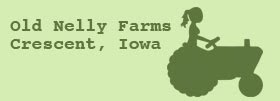CSA Newsletter July 13, 2011
Farm Happenings
The heat is on…And it is making our nightshades grow grow grow. The tomatoes have lots of small fruit but are not quite ready. It is very hard to tell when we will be able to enjoy our first tomato of the season but trust me, I am as anxious as all of you. We are hard at work trellising the tomatoes. We usually let them sprawl on the landscape fabric but are trellising this year in order to utilize more space and aid in harvesting. We are using a system that our relatives in Trinidad use for their tomato production. In true Trinidadian fashion, we (and by we I mean my dad) are salvaging and welding rebar. We are not really sure how it is going to work but as my dad says, “We are gaining experience.”
The peppers have many blooms and a few fruits but are coming along more slowly than the tomatoes. The same is true with the eggplants, as well as the tomatillos, ground cherries, and huckleberries we are experimenting with this year.
The replanted squash are very very small and I fear that their root system did not get a chance to develop. I will replant seeds and hope for a very late crop. A farmer at market told me to sprinkle shell corn on the ground after planting the seeds. The mice will then take that corn back to their nest and leave the seeds in the ground alone. Next year I will do transplants, but this year I will try that method.
For the next couple of weeks we will be biding our time until the tomatoes, peppers, and melons ripen. Until then, we appreciate your patience.
What’s in the Bag…
Dill: Our herb garden is having a rough go this year. We will be replanting our fall herb garden for preserving but this is delicious on fiah or in salad dressing.
Grape Leaves: These are usually stuffed for dolmades but can also be used to wrap fish before grilling it.
Beets: More beets…Don’t forget that the tops are delicious too. The food network has a plethora of beet salad recipes, they all look delicious. We suggest cutting off the greens and storing them separately as they can leach water from the root.
Turnips: More turnips. Get creative folks. I found some good recipes for turnip French fries and turnip soup.
Wild Raspberries: This is it for the season. I can’t say I am too sad about this as picking them is a real chore. Eat them fresh or lay them flat on a cookie sheet, put in the freezer, and break them out in the winter.
Zinnias: These are my favorite flower because they look great with just a single stem and I can fill up my house with flowers.
Broccoli: I am trying desperately to perfect my broccoli growing. I am going to try for a fall crop but for some reason the heads will not get large but the flavor is amazing. Also, I had to dust these with Dipel (see blog entry on Dipel) but these were dusted 10 days and it had rained heavily since.
Recipes
Caramelized Turnips: http://allrecipes.com/Recipe/caramelized-turnips/detail.aspx
Mashed Turnips and Cheese: Peel 5 whole turnips and cut into quarters. Boil in salted water for about 30 to 35 minutes, or until turnips are very tender. Drain off water. Mash turnips with a potato masher. Season with salt and pepper, and/or herbs of choice. Add 1 1/2 tablespoons butter and 1/2 cup grated cheese. Mix just until cheese starts to melt.
Beet Cupcakes: My niece Mira made these…delicious.
http://www.yumsugar.com/Beet-Cupcakes-Cream-Cheese-Frosting-2387075
Dolmades: http://www.foodnetwork.com/recipes/tyler-florence/dolmades-stuffed-grape-leaves-recipe/index.html
